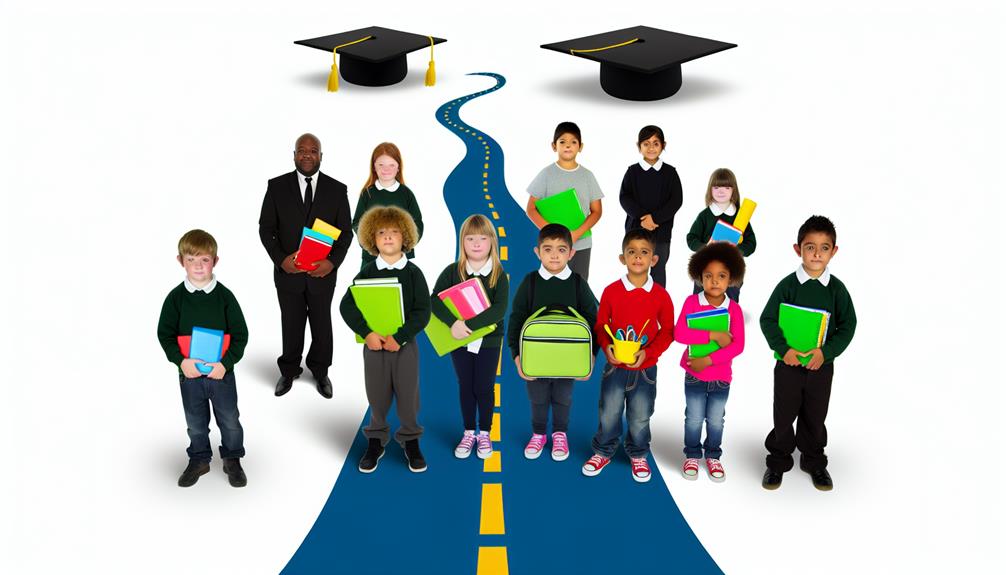In the UK, foster children's journey towards educational success is a complex one. Amid unique challenges, like trauma and instability, they endeavor to achieve academically. Foster parents play an invaluable role, providing emotional and educational encouragement. Schools offer a support system with initiatives like mentorship programs and SEN provisions. Policies such as the Pupil Premium Plus and the Children and Families Act also assist in elevating their learning experience. This narrative is brimming with trials and triumphs that shape their academic performance and overall life trajectory. Exciting insights await, offering a deeper understanding of their journey.
Key Takeaways
- Foster parents play a crucial role in fostering educational encouragement and guiding foster children through school challenges.
- Government policies such as the Children and Families Act 2014 and Pupil Premium Plus support the educational needs of foster children.
- Schools offer support systems such as mentorship programs and Special Educational Needs (SEN) provisions to aid foster children's academic journey.
- Educational resources are available for foster parents, including trauma-informed teaching strategies and training materials.
- Future prospects for foster children's education include post-secondary opportunities, scholarships, and life skills education.
Understanding UK Foster Care System

To truly grasp the educational success journey of UK foster children, it's essential that you first understand the intricacies of the UK foster care system. The system is guided by the robust Foster Care Legislation which oversees the welfare and rights of children in foster care. This legislation operates under the Children Act 1989 and the Children and Families Act 2014, ensuring the safety and educational needs of children are prioritised.
Part of the UK foster care system's complexity lies in its adoption process. Adoption Process Insights reveal a thorough and meticulous procedure aiming to match children with suitable families. It's a process that's not only about providing a home, but also ensuring the child's development, especially in education, is nurtured.
Understanding the UK foster care system is challenging, but it's significant in appreciating how it impacts the educational journey of foster children. It's a system that employs rigorous legislation and thorough adoption processes, all in the pursuit of creating a conducive environment for foster children's educational success. You'll realize it's a system that doesn't just provide a home, but also a platform for the growth and success of these children.
The Role of Foster Parents
As a foster parent, your role extends beyond providing a safe and nurturing home. It's also about fostering educational encouragement and guiding school challenges.
You're instrumental in the educational success journey of foster children, shaping their future by instilling in them the value of education. Remember, your influence can make a world of difference in their academic performance and overall life trajectory.
Fostering Educational Encouragement
Understanding the pivotal role you play as a foster parent in a child's educational journey, it's crucial to foster an environment of encouragement and support. The adoption impact can be profound, affecting the child's self-esteem, motivation, and their perspective towards learning.
As a foster parent, you're uniquely positioned to help the child overcome these hurdles. Strong sibling bonds can also be instrumental in encouraging a child to pursue education. They can provide emotional support and motivate the child by setting a positive example.
Your nurturing environment can help foster these sibling bonds, further contributing to the child's educational success. Remember, your influence can shape their future, so it's imperative to offer consistent encouragement and support.
Navigating School Challenges
School challenges might seem intimidating, but as a foster parent, you're equipped with the unique capacity to steer your foster child through these obstacles. You play a pivotal role in shaping their journey towards educational success.
Here's how you can help them:
- Be proactive in building strong peer relationships
- Provide consistent support during school changes
- Encourage open communication about their school experiences
- Advocate for their educational needs and rights
- Foster resilience and a positive mindset towards learning
The Impact of Foster Care on Education

As we explore the impact of foster care on education, you'll find that it introduces unique educational challenges.
You'll soon see how foster care can influence dropout rates.
Yet, amidst these challenges, there are also inspiring success stories of foster children overcoming the odds.
Educational Challenges in Foster Care
Traversing the educational landscape, you'll find that children in foster care often face substantial challenges, including disruptions in schooling, emotional trauma, and lack of academic support. The added burden of foster care stigma further compounds the issue, undermining their confidence and motivation.
To tackle these challenges, a trauma-informed teaching approach can be instrumental. This approach understands and addresses the impact of trauma on learning. Consider these factors:
- Inconsistent academic environments due to frequent placement changes
- Emotional distress hindering concentration and learning
- Lack of continuity in curriculum due to school changes
- Limited academic support at home
- The adverse impact of stigma on self-esteem
Understanding these challenges is the first step towards ensuring these children can navigate the path to educational success.
Foster Care and Dropout Rates
Shockingly, children in foster care are more likely to drop out of school compared to their non-foster peers, a stark reflection of the profound impact foster care can have on educational outcomes. This issue, highlighted by foster statistics, is a call for urgent action.
The journey to educational success is fraught with challenges for these children, often resulting from instability and trauma. Inconsistent school attendance, behavioural issues, and difficulties in maintaining relationships can compound these challenges.
But you can play a role in changing this narrative. Caregiver training is a critical component. By equipping caregivers with the right tools, you can help foster children navigate educational hurdles, thereby reducing dropout rates and paving their way to success.
Overcoming Obstacles: Success Stories
Despite these challenging statistics, there are inspiring success stories of foster children who've overcome these obstacles, demonstrating the positive impact quality foster care can have on education.
Imagine these scenarios:
- A girl, initially struggling with literacy, developing a love for books and becoming a high-achieving student.
- A teen, once disengaged in school, now excelling in mathematics due to his foster parents' patient guidance.
- A young child, traumatised and withdrawn, starting to thrive in a nurturing foster home, her creativity fostered.
- A boy, with no prior interest in sports, discovering his talent for football in his foster family.
- A foster teen, initially hesitant towards education, becoming a university graduate.
These stories of resilience building and fostered talents show the transformative power of dedicated foster care.
Unique Educational Challenges for Foster Children

You might not realize it, but foster children in the UK face a unique set of educational challenges that can hinder their academic progress. These children often carry the burden of trauma, which can greatly impact their ability to learn and adapt to a new educational environment. This is where the importance of therapeutic education comes into play.
| Challenge | Impact | Potential Solution |
|---|---|---|
| Trauma effects | Inability to concentrate, emotional instability | Therapeutic education |
| Lack of stability | Difficulty forming relationships, inconsistent academic progress | More stable placements |
| Educational gaps | Struggling with coursework, lower grades | Targeted educational support |
| Feeling of isolation | Reduced participation, lower self-esteem | Fostering inclusive school culture |
Therapeutic education aims to help these children cope with their past and present experiences, building resilience. It's not just about academic achievements, but also promoting emotional well-being. Similarly, more stable placements and targeted educational support can address the issues of forming relationships and bridging educational gaps. Finally, fostering an inclusive school culture can mitigate feelings of isolation, helping foster children feel accepted and valued. Understand that these are not quick fixes, but necessary steps on their journey towards educational success.
Support Systems for Foster Children in Schools
To ensure foster children in the UK overcome these educational hurdles, a well-rounded support system within schools plays a crucial role. This support system should be inclusive, addressing not just academic challenges but also providing emotional support. You must understand that these children often grapple with feelings of abandonment, insecurity, and confusion.
A successful support system could entail:
- The integration of Mentorship Programs where seasoned students guide foster children through the school experience.
- The provision of Emotional Support through well-trained counsellors who understand their unique experiences.
- The development of a Safe Space for foster children to share their feelings and experiences without fear of judgement.
- The establishment of Peer Support Groups to foster camaraderie and mutual understanding among foster children.
- The availability of Special Educational Needs (SEN) provisions to cater to children who may struggle academically due to their circumstances.
Case Studies of Foster Children Successes

Numerous inspiring examples highlight the educational achievements of foster children who, with the right support systems in place, have defied the odds and thrived academically. You'll find that the influence of foster siblings often plays a pivotal role in these successes. Let's consider the case of Emma, a UK foster child who, supported by her foster sibling, managed to secure a place at a top university. Her foster sibling's mentorship was instrumental in her academic achievements, showcasing that the family environment can profoundly influence foster children's educational success.
Don't overlook the cultural impacts on education either. For instance, in diverse societies like the UK, the intersection of foster care and cultural background can shape educational experiences. Take the case of Aman, a foster child with a South Asian background. Despite early educational struggles, Aman leveraged his cultural heritage to excel in multicultural studies, highlighting the role of culture as a motivational force.
These case studies underline that with the right familial and cultural support, foster children can defy expectations and achieve academically. It's a hopeful reminder that every foster child carries the potential for considerable academic success.
Government Policies on Foster Childrens Education
While these personal success stories are inspiring, it's equally important to examine the role of government policies in shaping the educational outcomes of foster children. Policy evaluation has shown that legislation impacts the lives of these children to a great extent.
In the UK, several key government policies influence foster children's education:
- The Children and Families Act 2014 emphasizes the role of a 'Virtual School Head' to oversee the education of children in care.
- The Pupil Premium Plus, introduced in 2014, provides additional funding to schools to improve the educational attainment of disadvantaged students, including foster children.
- The Education and Inspections Act 2006, which mandates local authorities to promote high educational standards and fair access to opportunities for all children.
- The Children Act 1989, which underlines the duty of local authorities to safeguard and promote the welfare of children in their care.
- The Equality Act 2010, which aims to eliminate discrimination and promote equality of opportunity in education.
These policies, when effectively implemented, provide a supportive framework that can help foster children overcome educational barriers. However, continuous monitoring and revision are necessary for these policies to truly make a difference in these children's lives.
Educational Resources for Foster Parents

Traversing the educational journey of a foster child can be a challenging task, but thankfully, a plethora of resources exists to empower foster parents with the tools they need to guarantee success. You'll find that these resources often incorporate Trauma Informed Teaching strategies and Special Needs Adaptation techniques, essential for fostering a supportive and effective learning environment.
Trauma Informed Teaching encourages understanding the impact of trauma on a child's learning capabilities, and how to engage them in a positive, supportive manner. Foster parents can access training materials, webinars and workshops to deepen their knowledge of this teaching approach.
Further, children with special needs may require specific adaptations in their learning environment. Special Needs Adaptation resources can guide you in tailoring an education plan that fits their unique needs. These resources include instructional guides, online courses and personalised support from special education professionals.
Future Prospects for Foster Childrens Education
Despite the hurdles along the way, there's a promising horizon for the educational prospects of foster children, and you can play a pivotal role in shaping it. With the right resources and guidance, these children can overcome their challenging pasts and embrace a brighter future.
Consider the following:
- Post secondary opportunities: Foster children can thrive in universities or vocational schools. They just need the right support.
- Foster child scholarships: Numerous organisations offer scholarships and grants specifically for foster children.
- Mentorship programs: These provide foster children with role models who guide them towards successful paths.
- Careers advice: Many foster children lack exposure to different professions. Career counselling can open their eyes to a range of possibilities.
- Life skills education: Foster children need to learn more than just academics. Life skills will prepare them for the real world.
Frequently Asked Questions
What Psychological Support Is Available for Foster Children Struggling With the Transition to a New Home?
You can access various therapeutic techniques designed to build emotional resilience. These services help foster children cope with the challenges of adjusting to a new home, supporting their psychological wellbeing during this critical period.
How Are the Biological Parents Involved in the Foster Child's Education, if at All?
Biological parents, with parental consent, can be involved in their child's education, depending on their rights. It's a complex situation, requiring careful analysis to make certain the child's educational success is at the forefront.
What Is the Average Cost of Fostering a Child in the Uk, and How Is It Covered?
You might assume foster care's costly, but in the UK, it's mostly covered by childcare resources. The average cost is around £400 weekly, but it's offset by Foster Care Financing and other government support.
How Does the UK Foster Care System Compare to Similar Systems in Other Countries?
You'll find the UK foster care system's comparative analysis interesting. It varies widely due to cultural differences. Some nations prioritize kinship care, while others prefer institutional care, making each system unique and complex in its own right.
Are There Any Specific Programs Available for Foster Children Interested in Pursuing Higher Education?
Yes, there are. You'll find programs like Foster Scholarships that provide financial aid. Additionally, Education Advocacy groups exist to support foster children's pursuit of higher education, offering guidance and resources.
Conclusion
You've now journeyed through the world of UK foster care and its impact on children's education.
It's inspiring to know that, despite the hurdles, 50% of foster children pass their GCSEs, matching the national average.
With the right support and resources, these children can thrive.
It's a confirmation of the resilience of these kids and the importance of foster parents and educational policies.
Let's continue to empower them towards a brighter future.




